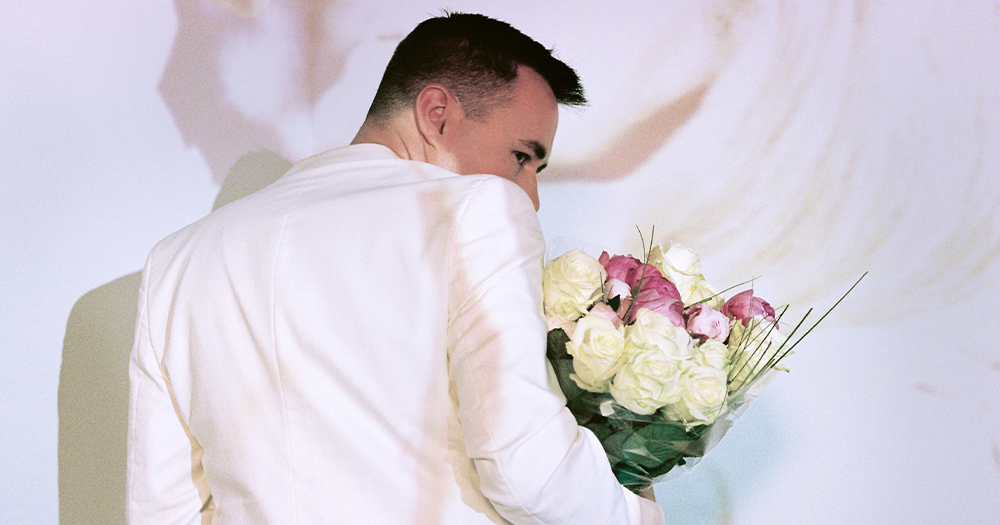Romances, the latest release from The Late David Turpin, is the result of a collaboration with over 60 artists, with ten performers lending their voices to his creations, weaving something completely unique that is also unabashedly gentle and queer.
“I wanted to do something with other people’s voices,” Turpin explains in response to a question about the impetus behind the album. He emphasises that the “cult of the lone creator,” where an artist writes and sings everything themselves, was something he wanted to move away from. “One of the things about art is that it’s the closest thing to getting out of your own body,” he comments, beginning a thread of discussion around escape which runs through the interview.
One of the things that Turpin wanted to do with this record was to work with male lead vocalists, specifically in a context which focuses on loving sex, and participating fully in romance. Claiming for the masculine something which is often used to objectify and demean women was important for the album’s creator. “The last time I checked, romance and sex and love pertain to both men and women equally,” he observes. Then, playfully: “It would be freakier to have men.
“The freakiness of something is sometimes its own reward.”
He is firm that the album is a sharing of skills and ideas between the collaborators. “It’s reductive to another person to ask them to do things you can do anyway.”
Of the ten special guests on the album, only one – Jamie Nanci – sang a song, ‘Unsolved Mystery,’ specifically written for him. The rest of the songs are collaborations between Turpin as the author and one of the other artists, as a singer, and the production developed around the process of figuring out what worked for both.
Along with songwriting, Turpin also writes screenplays. Screenwriting is “a different part of your brain,” to songwriting, he says: “it is a lot more of a negotiation, and that can be both really rewarding and like a crossword.” In music, he says he is “more liberated, less inclined to self-censorship and self-moderation.”
And the potential for romance is, well, a lot easier. “[A lot] of pop music is about romance, but to get a romance movie off the ground is so much more than that. It has to be – it’s a romance but they’re spies, or it’s a romance but they’re heroes.” Turpin shares that the next movie he is working on, like his previous film, The Lodgers, will be very gothic.
“The gothic has allure because it is a way to talk about the forbidden,” Turpin explains. “It becomes a metaphor where we can talk about [difficult] things…especially to do with sexuality, or family.”
The artist goes by The Late David Turpin, a name which appeared after his previous album, We Belong Dead. “Then the other David Turpin took it, so I guess I’m stuck with it,” he exclaims, referencing the horrific 2018 case where a Florida couple were discovered to have imprisoned their 13 children in a basement for years.
It didn’t distinguish the artist fully from his criminal namesake, however: “When that awful crime happened, my Facebook was blowing up with message requests from ladies in the US asking me to marry them, or join their church – more marriage proposals than I’ve ever had for myself!”
In the conversation, the serious and the light-hearted sit comfortably side by side: at one stage he comments that Ursula the Sea Witch from The Little Mermaid was the inspiration for Romances. Turpin is equally as open about his own near-death experience, where he died for 28 seconds. Although this experience was a difficult one, it is both an inspiration and a motivation: his job is to “take shit and turn it into gold, and find an interesting way to talk about what’s happening to you. I am conscious that what I do is entertainment; it’s not just there for me to hold forth about my bullshit! I have to turn that into something that someone else can enjoy.”
Art inspires a wider conversation about mental health. “When you try to die, everyone will stop you, but when you try to live, nobody’s going to help you.” He cites the unwillingness to deal with the fact that people are often trying to speak up about their mental health issues, but we are often not equipped with the right language to listen. “[The suggestion of], ‘just talk to someone’ puts the onus on the people who are suffering.
“The will is there and the intention is good [but]…funding poster campaigns telling people to talk to friends is an inadequate substitute for functioning mental health services.”
Turpin is focused on filmmaking for the moment, but doesn’t rule out future music production. “I would like to sing again, but you have to like the feeling of the words in your mouth. It has to be a very pleasurable thing.”
Romances feels like a success to Turpin, so much so that he can relisten without his usual post-release embarrassment. The interview concludes with the artist’s desire for others to also take pleasure in the music, in the most gentle way possible.
“Honestly, my desire for my work is that people enjoy it, that it would be part of the oxygen of people’s home lives.”
© 2019 GCN (Gay Community News). All rights reserved.
Support GCN
GCN is a free, vital resource for Ireland’s LGBTQ+ community since 1988.
GCN is a trading name of National LGBT Federation CLG, a registered charity - Charity Number: 20034580.
GCN relies on the generous support of the community and allies to sustain the crucial work that we do. Producing GCN is costly, and, in an industry which has been hugely impacted by rising costs, we need your support to help sustain and grow this vital resource.
Supporting GCN for as little as €1.99 per month will help us continue our work as Ireland’s free, independent LGBTQ+ media.
